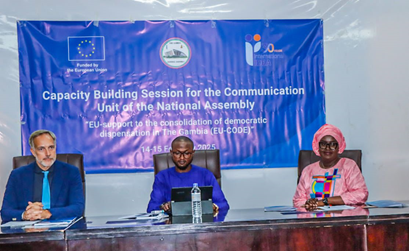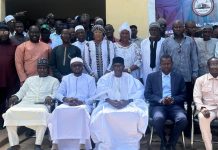By Kebba AF Touray
The National Assembly, in partnership with the European Union (EU) and the International IDEA, conducted a two-day refresher training over the weekend for the staff of the Communication Unit of the Legislature.
The training was designed to ensure that the National Assembly communication officers are equipped with both theoretical aspects of communications and digital skills, such as managing social media, producing content for online platforms, camera operations, and audio management, among others.
“It will equip the communication officers with the skill needed on a daily basis to effectively communicate internally and to the public,” said the organizers.
They further added that the strategy was developed within the framework of creating awareness about the National Assembly and its functions, promoting positive change in perception, beliefs, behaviors, and attitudes towards the National Assembly, and most importantly, projecting the National Assembly as a trustworthy and transparent institution.
Jainaba Faye, Country Director of International IDEA, explained that in 2024, as part of the EU-funded CODE project, they supported the development of a 4-year National Assembly Strategic and Investment Plan to create an open, transparent, and democratic legislature.
This, she said, is bound by the principles of good governance, accountability, and probity to provide effective legislative scrutiny, oversight, and representation for the citizens of the Republic of the Gambia with a motivated staff force rooted in integrity and professionalism.
This follows the development of a 3-year communications strategy that seeks to implement the National Assembly Strategic and Investment Plan.
“The Communications Strategy aims to bridge the gap between the legislature and the public, improve communications and flow of information within the National Assembly as well as with its valued stakeholders,” she indicated.
“Your role in the National Assembly is not just a supportive function but a central pillar to its effective governance. You ensure that the policies, decisions, and debates that take place within parliament are clearly communicated and understood by the citizens they represent,” she said.
She cited that whether through press releases, social media, public statements, or briefings, the communication units are required to present information in a way that is not only accurate, but also engaging and comprehensible.
Given the rapidly evolving media landscape, with social media platforms and digital communication taking on an increasingly dominant role, she called for the need to embrace a holistic approach.
She told the officers of the legislative communication unit that “to be effective, as parliamentary communications officers, you must stay ahead of these trends and adapt new strategies.”
Mr. Raphaël Brigandi, Deputy Head of Mission of the EU, said that the legislative process goes through several stages to ensure that laws are carefully considered before they are passed.
This, he said, ranges from the introduction of a Bill in the National Assembly to its review in committees, multiple readings, and final approval by the President and vote.
He said, “Each step involves important discussions that shape the national political and policy debate.”
The people, he added, need to understand and engage with this process, but also grasp the issues and proposed solutions at stake, so that all Gambians know how the laws might affect their daily lives.
He said: “Understanding the process and the decision-making process is therefore critical to help build trust between citizens and their representatives to eventually strengthen democracy altogether.”
The Clerk of the National Assembly, Khalipha MM Mbye, stressed that capacity building for their staff is one of the key instruments through which they can make the National Assembly grow and honor its social contract with the people.
He said, “Having well-framed communication professionals with the requisite skills and know-how and well-structured communications and outreach approach revolving around a structured communication framework, will go a long way to enhance the visibility of the Assembly on all media.” Clerk Mbye challenged participants to practice the knowledge gained from the training and called on the International IDEA to ensure its continuous support.



















